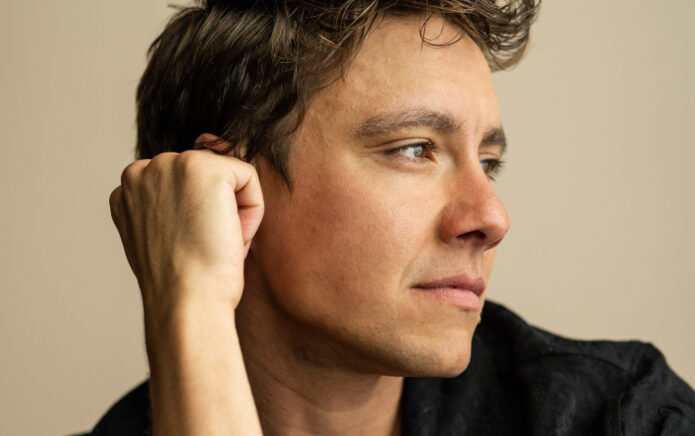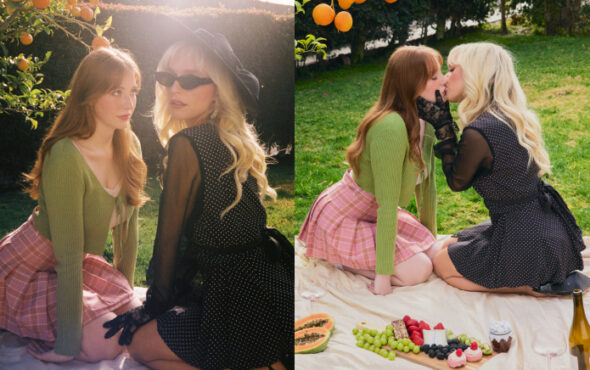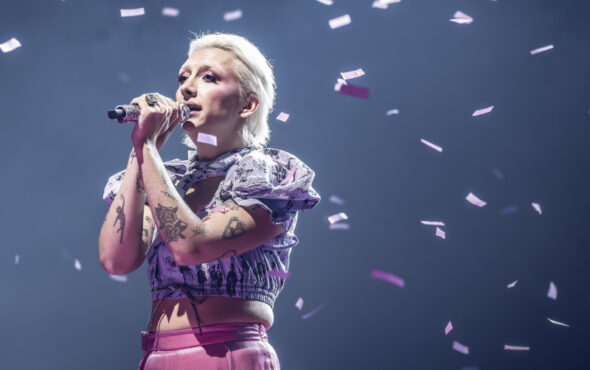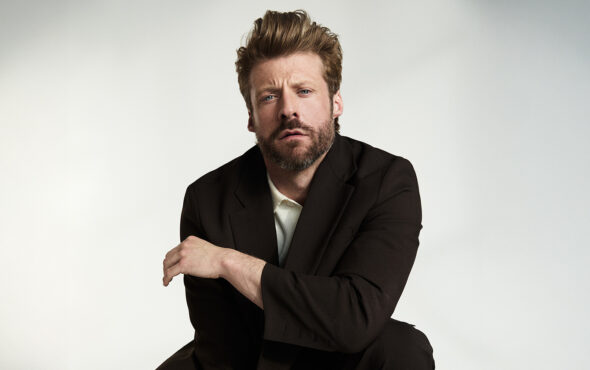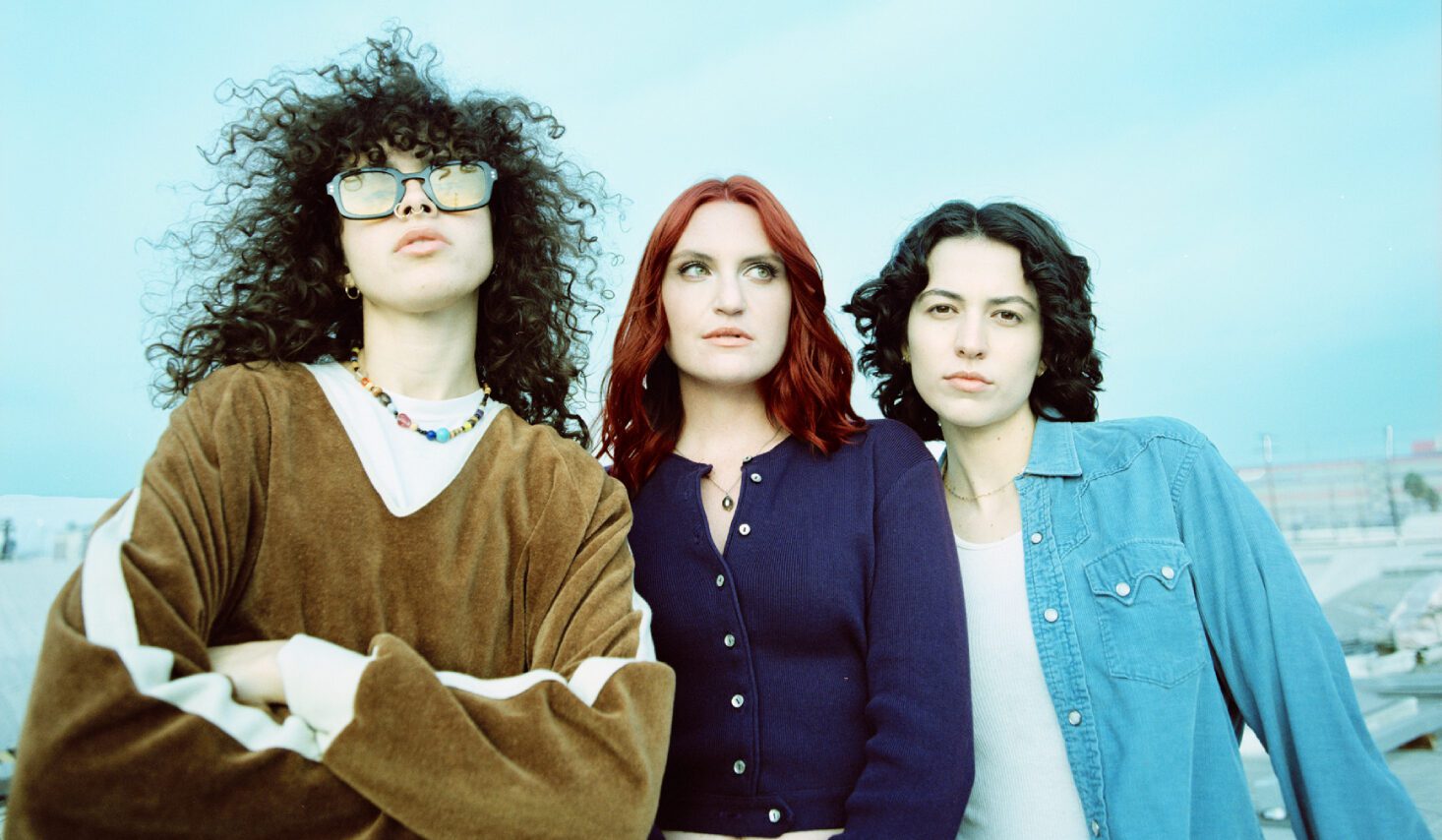
“MUNA is keeping punk queer –– that should be the title of this interview,” lead singer Katie Gavin quips. It’s early afternoon and MUNA are having a late start. Huddled together on a Shoreditch beer garden bench, the self-proclaimed “greatest band in the world” are feeling optimistic. A lot has changed since the Californian three-piece last spoke to GAY TIMES. As a relentless pandemic-imbued music industry ground to a halt, the trio found themselves suddenly dropped from RCA Records in early 2021. So, MUNA did what they do best: persevere.
Emerging in 2017, MUNA aligned while studying at The University of Southern California. Together, they surfaced with captivating college-pop confessionals and hyper politicised dance beats. Released in the same year, MUNA’s debut album About U arose as an 80s synth-pop pastiche amalgamating curiosity and queerness. Behind them, a pluralistic fanbase followed — a cult community that honoured the band’s on-scene ambush of unapologetic lyrics and buzzing melodies. MUNA’s matured second album, Saves The World, arrived a couple of years later and remains a magnum opus of misery and enlightenment. Since then, the band’s rise has been hallmarked by game-changing artists, notably Harry Styles, Phoebe Bridgers, and Kacey Musgraves. Now, on their upcoming self-titled album, satisfaction is not an emotionally wrought proposition, but a permissible goal. Welcome to the MUNAfication of pop.
Overlapping and fumbling through memories, the band are trying to pinpoint their last GAY TIMES interview. It takes singer and songwriter Katie Gavin to redirect the band to the current. In a few hours, MUNA are set to perform at a sold-out show at The Garage, Highbury. It’s one of the last shows the band will play before their self-titled album is out. MUNA, a radical pop collective, is made up of vocalist Katie Gavin and instrumentalists Naomi McPherson and Josette Maskin. Together, they’re navigating their new era and digesting what will be their third record as a defiant unit. “We’re processing it as we speak. It feels like we are discovering the album as a whole,” Naomi explains. “We’ve had a bit of time away it and the grind of making it. Now, we get to ascribe meaning to it and try to figure out what it means for us.” The new project, which comes out 24 June, has seen the trio join forces with Mitski for a boyband 90s sexual pop anthem. While, elsewhere, the Kacey Musgraves-approved Daniel Tashian and Ian Fitchuk collaborated with MUNA for the mega-hit Silk Chiffon. Despite its early impressions, Katie is hopeful the bulk of the album will surprise fans: “This record goes in so many different directions, so whatever people think of the record from the singles, they’re going to see it almost takes a left turn.”
Looking ahead, MUNA have set their sights on the lasting impact of their self-titled effort. So, how does a song make it into the MUNAverse of pop? Well, as Josette summarises, the formula lies in Robyn-esque stylings channelled through “deep meaningful lyrics” and a “solid dance beat”. The colour and candour of MUNA is what make the band distinctly their own. To put it simply, the MUNA doctrine, as Josette elaborates, is one of unity — “We want our shows to provide a sense of release for our audience. We are trying to set up a gay Church, ain’t no boring church.” And, in its own right, MUNA’s fostered community is self-evident (or as Katie likens it; “it’s very RuPaul”). The band’s lead single for the self-titled record, Silk Chiffon, was emblematic of their die-hard cult following. Both the band and their listeners found common ground in the desperate need for queer joy. For Katie, she found solace in the happy mundane (“I felt kind of romantic with myself,” she laughs. “It’s no secret that I’m good at romantic fantasy”) and enjoying her own company.
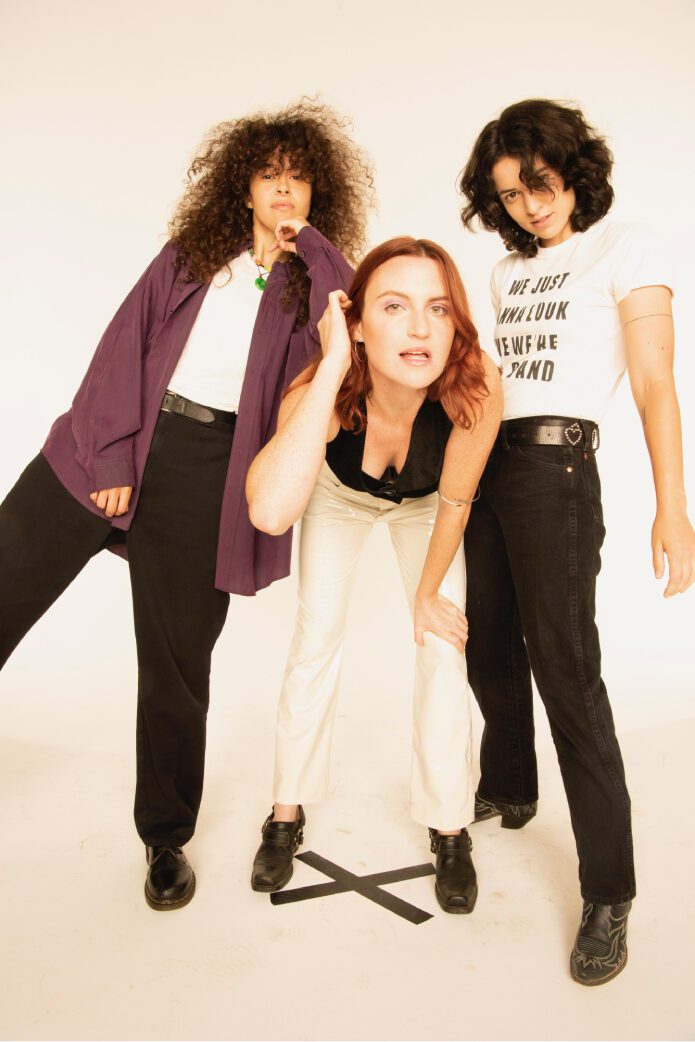
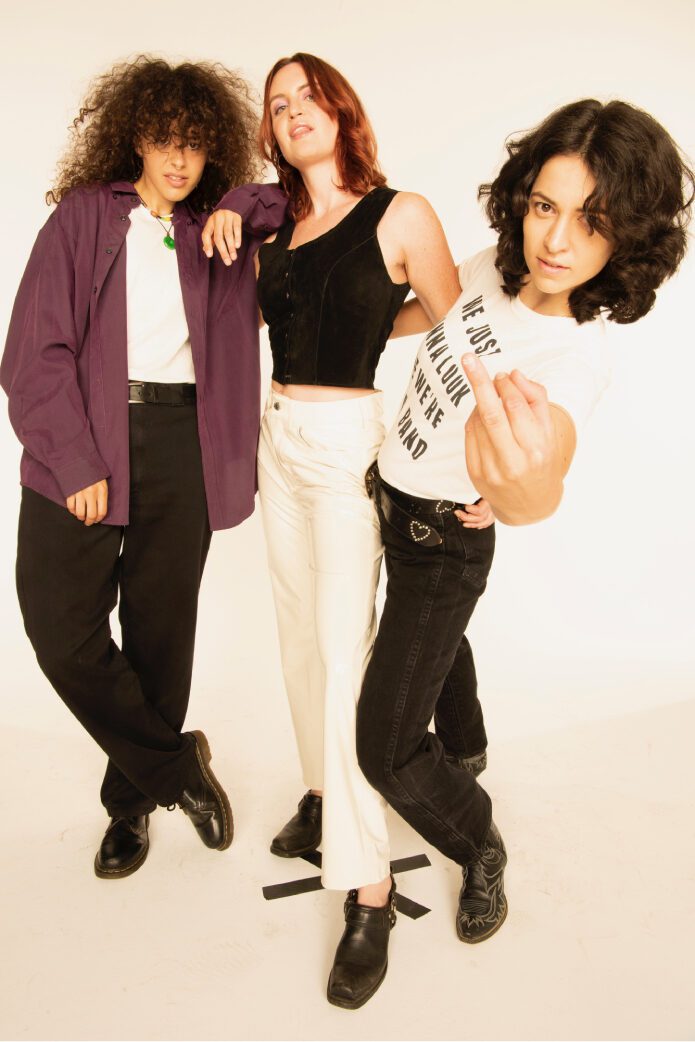
Treading a balance between experiencing joy and acknowledging its loss remains a weighted dynamic for the trio. “There’s something that we’ve tried to express with this record,” Katie explains. “When it comes to moments of peace or joy, allowing yourself to receive those emotions is hard. It took a really long process of making changes in my life where I was even willing to be happy.” As a largely self-documented band, forking out emotional value and “trauma porn”, particularly as LGBTQ+ people, became exhaustive. MUNA, as a whole, became tiresome of that rhythm. “It’s encouraged to write about your pain so a white or straight person can empathise with your struggle,” Naomi says. “No way, fuck that, read it and change how you live your fucking life.” As queer people, the band agree we fall upon an understanding (and necessity) for imposed boundaries. “Another piece of this record that we don’t talk a lot about is actually boundaries,” Katie adds. “It’s really cool that you have an awareness that there are some things in your life that are just for yourself because it’s really hard work to feel out your own limitations. But, as we’ve gotten older, we’ve learned what we can share and what we need to keep to ourselves and that allows me to have the energy to have good days.”
MUNA are at the masthead of rewriting pop’s queer legacy. In their unashamed existence, the trio are forcefully reimagining a genre with lyrics surveying past relationships, struggling mental health and, now, a move towards happiness. For the band, the sanctity of MUNA extends past their blistering beats and into their shared lyrics. “What’s really sacred with MUNA is the songs about our personal relationships, and the stuff about each other,” Katie tells GAY TIMES. “In the second record there was some hard stuff around talking about myself, especially when I’m talking about my family history.” These shared moments, between music and fans, are what set MUNA apart. Take, MUNA’s banner hit I Know A Place – or politicised scream-along banger Loudspeaker – which has created a sonic safe space for the queer community. “It’s such a purpose giving experience when a song resonates with a certain community — it’s so affirming,” Naomi says. “We have a heart-soul connection, and that is so meaningful. We’re so aware that someone is going to listen to this and it’s not just us.” Nodding, Josette agrees: “It keeps us going as a band. It’s the purpose of making a song that is for someone else. I believe in the power of MUNA, which is a thing that is outside of the three of us and that has always been the guiding principle of whatever we do.”
Soon to be three albums deep, the fateful connection between fan and band is not taken for granted by the alt-pop trio. A shared personal anecdote about their debut album later, the band shuffle together in meagre efforts to hide their crying. Noami orders the trio to all “look away” and hides behind their thick-framed shades. It’s no surprise – MUNA have always been unafraid to wear their emotion outright. “That first record we made, About U, I don’t think we knew anything about what we were doing or why we were making the decisions that we were making,” Josette says, wiping tears. “We were just making songs, the three of us in college, and not knowing that anything could ever have an impact, but they were going to become the anthem of who we were as people and who we were as a band – that arbitrary decision was pure God energy. The concept of MUNA has always been a step ahead of us.”
MUNA’s music is a versatile mosaic of queer experiences, even if it is pummelling through an emotional crisis. “We took that into the second record knowing that what you say holds meaning to people,” Noami says. “You’re in immense pain and have that responsibility to not succumb to that pain and to defeat it is referenced in the music. At the end of it, it was exhausting to be embroiled in some kind of feverish, intense emotion. So, what if that emotion was fun and positive? I think that was what was missing from our discography and that’s what this new record does.”
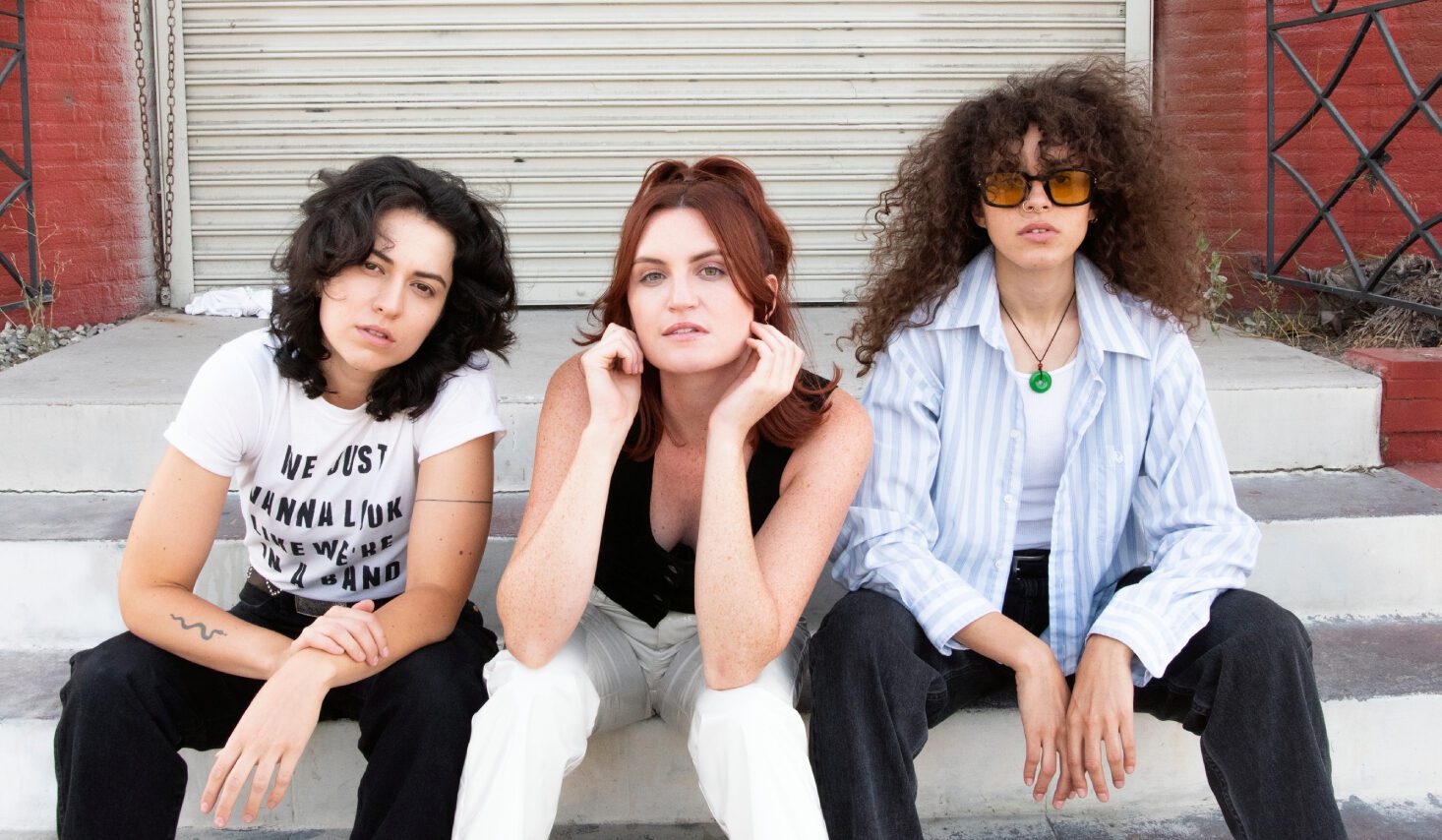
A triad of emotionally aware creators, the band’s “chronological” transition to their Phoebe Bridgers-backed album is an intentional “movement into the next”. That said, MUNA are not moving on from their past legacies but “holding ourselves in a different way”. Josette likens the change to the currently unheard track Loose Garment on the self-titled project. “The pain that is in the first record, is in the third record. It’s the best encapsulated in a Loose Garment: “”I used to wear my sadness as a choker” – you’re allowed to still have it there. It’s not causing you to suffocate as much. You will still experience pain, but it’s how you move through it and how you relate to yourself.”
The cyclical, intertwined nature of MUNA is the band at its best. The trio work side-by-side like a well-adjusted palette of primary colours, even if they tend to be a little grittier than most. “We were cognisant of that reality and we want to be the band we wished for when we were younger. It would have meant the world to me, it would have changed my life,” Naomi explains. MUNA first emerged as a self-labelled punk band and refuse to be gutted of their political roots. “We want to be careful about not letting ourselves be de-radicalised in the way that capitalism will try to take your identity, defuse it of any meaning, drain it like an old rag and then try to sell it to someone devoid of meaning entirely,” they add. “We are just trying to retain our artistic and political integrity in this reality, which is so difficult, whilst still surviving!”
MUNA’s fringe-mainstream success has given the band a unique vantage point. The trio have experienced the highs of big tours and the commercial drawbacks of being an openly all-queer project. Josette reveals they’ve been asked a lot about the bloom of successful LGBTQ+ artists lately. “I’m so proud of all the people in our community who are doing well in music, but I can almost fucking guarantee you, that they are not making the same amount of money as their heterosexual white peers,” Noami says. “We’re still marginalised in this industry, we’re still not being paid as much as people who are as successful as us. We might be up on a poster, you might see us up on a cover of something, but the material conditions of our reality have very barely shifted from when we started this band and that’s the truth.” The slow-paced advancement of this homegrown band seems startling given their repertoire of critically-acclaimed records. Still, despite their own situation, MUNA have remained the resilient cheerleaders driving this grassroots momentum for newer artists. “Everybody knows what the fuck is up. We’re out here we’re taking over,” Naomi crows. “Let’s keep queer punk. Let’s keep it fucking political!”
Later, at their sold-out Islington show, Katie tearfully takes a moment to thank their fans. As a screaming ovation echos through the sweatbox venue, the trio are overwhelmed and vocally grateful. Shedding aside a shaky two years on stage, MUNA remain a gloriously intense vision of queer heart.
MUNA is out 24 June via Saddest Factory Records.
